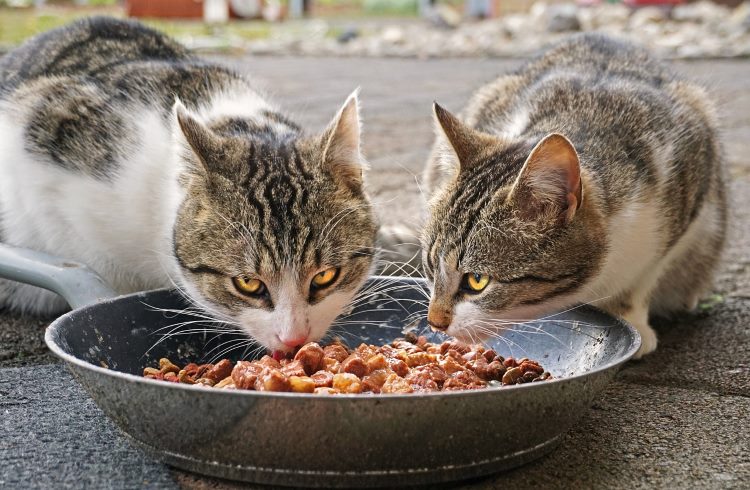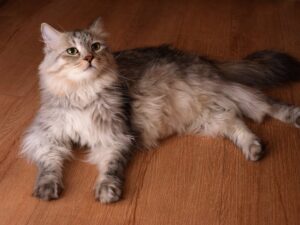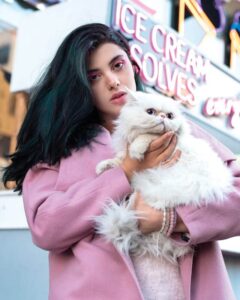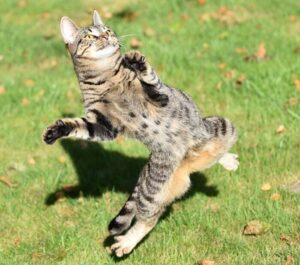Cats are one of the most popular domesticated pets worldwide due to their outgoing personalities. As cat owners, all we want is the best health for our furry companion and this involves feeding them a healthy diet.
Cats are primarily carnivores and naturally, their digestive tract is designed to digest protein obtained from an animal source. Centuries of evolution and coexistence with humans have enabled cats to consume diets and foods that are not a natural part of their diet such as grains.
As a cat owner, have you ever wondered what is the real truth behind the hype of grain-free pet food and whether or not it is actually beneficial for your cat? Read on as this blog post is a comprehensive guide about grain-free cat food and how it affects the health of your cat put together by a small animal veterinarian so you can choose what is best for your kitty.
Are Grains Necessary For Cats?
Before we move on to the discussion about grain-free cat food you must first understand whether grains are important in the diet of your cat or not. In general, cats can survive without consuming grains since the major part of their diet, about 70% should be protein.
One thing to keep in mind about the diet of your cat is that carbohydrate content should be less compared to protein.
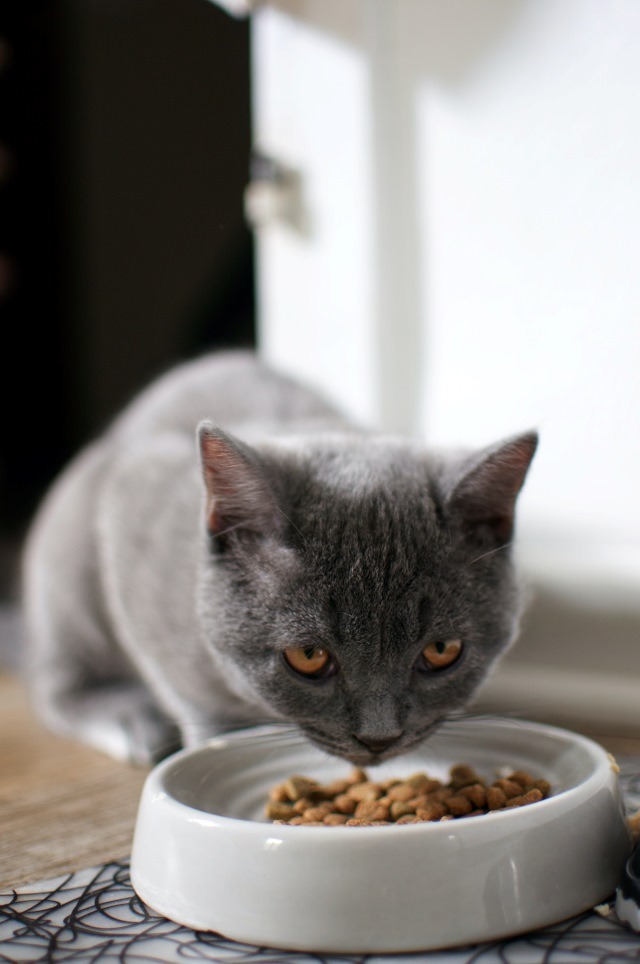
Benefits of grains for cats:
Grains are not necessary for cats doesn’t mean they are not beneficial for them. Some grains that are low in gluten such as rice, oats, corn, and a few others can actually be quite beneficial for your cat. Some of the benefits of eating grains for cats include:
- Grains are a good source of vitamins such as vitamin B
- Grains provide cats with essential minerals such as iron, magnesium, and selenium
- Grains are rich in fatty acids
- Great source of carbohydrates for cats
- Whole grains can provide cats with protein
Myths regarding feeding grains to cats:
Despite the benefits, many myths are associated with feeding grains to cats. Let’s debunk some of these myths:
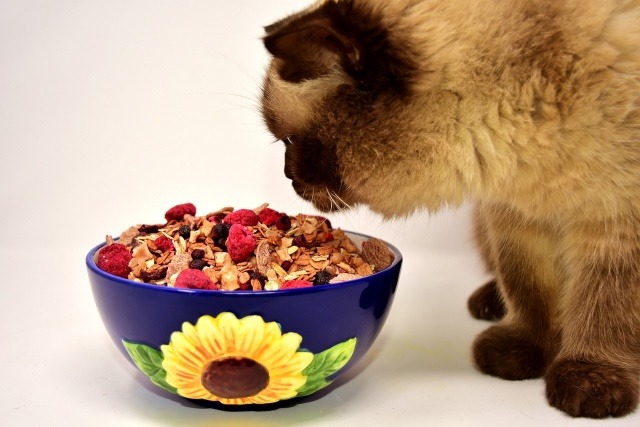
1. Grains cause food allergies in every cat
Grains can cause allergies in cats but not in every cat. Only a few cats can develop grain allergies and you will be surprised to know that beef is the major allergen behind most food allergies in cats about 17% according to BMC Veterinary Research.
2. Grains have low digestibility
A cat’s digestive tract is generally designed to digest protein since it is a major part of their diet but it is not true that they cannot digest grains. Grains used in cat food are processed into meals to increase their digestibility and in fact, corn has one of the highest digestibility indexes of about 87.5%.
3. Grains cause obesity in cats
Since grains are rich in carbs many people have a misconception that feeding them will lead to obesity in cats. Scientific data suggests that carbohydrates obtained from grains actually lower hunger in cats promoting weight loss.
4. Grains cause gluten allergies in cats
This myth is somewhat true as feeding some grains can cause gluten allergies in cats. Grains that are rich in gluten include wheat, barley, and rye.
Is Grain-Free Cat Food Healthy?
Pet food trends have been influenced by human diet choices. Grain-free cat food became popular after the 2000s when the trend of low-carb diets for humans hit the pet food industry.
More and more pet food companies started producing cat foods that were grain-free to minimize carbohydrates. After 2010, when awareness of gluten-free food became widespread, the trend of grain-free cat food also experienced tremendous growth in popularity.
Generally, many cat owners prefer grain-free cat food for their pets because they believe it resembles their natural diet and helps reduce the incidence of allergies and since there are no grains, cats will enjoy eating the food. Being low in carbohydrates and gluten-free are also reasons why many cat owners choose grain-free cat food.
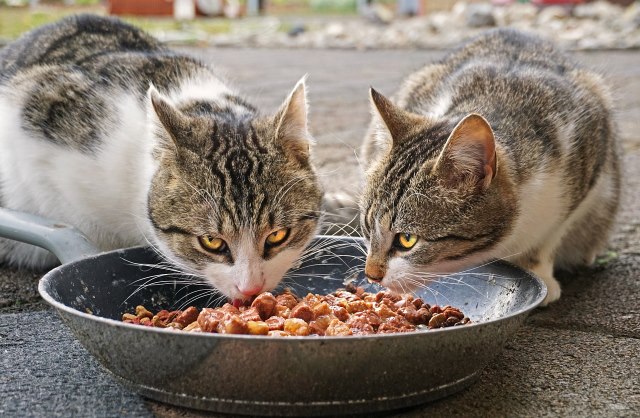
However, there is little to no scientific evidence or data that actually indicates that grain-free cat food is healthy for cats compared to other diets. In fact, it can be sometimes harmful to the cat because some pet food brands add fillers and by-products to balance the carbohydrate content in the grain-free cat diet.
In the past, there have been incidents where some companies have actually included peas, lentils, and potatoes to increase the carbohydrate ratio while keeping the food gluten-free. The disadvantage of such ingredients is that they contain a lot of starch and offer little to no protein and fat.
Also, not all grain-free cat foods are gluten-free because some of them may contain hidden ingredients that actually contain gluten.
That is why it is always advised to buy grain-free cat foods from good brands that don’t use unhealthy grain alternatives.
Benefits Of Grain-Free Cat Food
If grain-free cat food is made with healthy ingredients it surely provides certain benefits to cats. Some benefits of grain-free cat food are listed below:
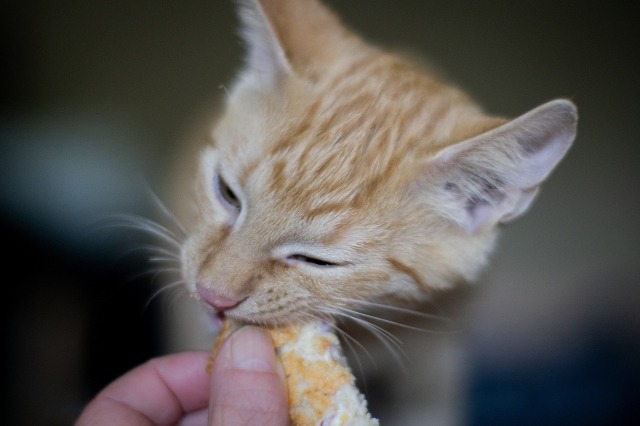
- Grain-free cat food is a good source of high-quality animal protein for cats. Protein is a necessary nutrient for proper development and growth in cats.
- Grain-free cat food is a great option for cats who suffer from grain allergies. Offering grain-free cat food will lower the risk of grain allergies in cats and will improve the health of their skin and coat.
- Since some cats can suffer from gluten intolerance, offering them a grain-free diet is good for their health.
- Most veterinarians recommend a grain-free diet for cats that are obese and need to lose weight since it is low in carbohydrates.
- Many cats can be very picky when it comes to food. If your cat is a picky eater try offering grain-free cat food as cats tend to enjoy it and can’t resist it.
- Grain-free cat food is an excellent source of nutrition for kittens in particular. It is full of protein which improves their growth rate and overall health.
- Grain-free cat food has a high palatability and digestibility compared to other foods.
Truth About The Drawbacks Of Feeding A Strictly Grain-Free Diet To Cats
After benefits, let’s look at some of the drawbacks of feeding a grain-free diet to cats:
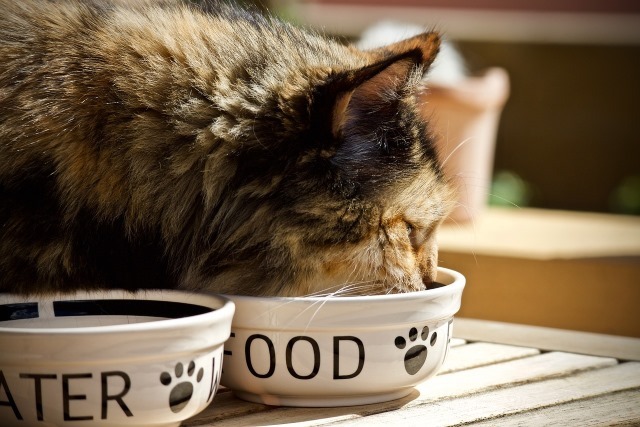
Dilated cardiomyopathy (DCM)
DCM is a condition in which the normally thick muscular walls of the main pumping chamber of the heart (left ventricle) become thin, weak, and lose elasticity. Due to these issues the size of the left ventricle increases. As the size of the chamber increases, the heart is unable to generate enough pressure to efficiently send oxygenated blood toward the body.
Now you will think about what grain-free cat food has to do with DCM. In 2018, FDA started to investigate a possible connection between certain pet diets and DCM in canines. Because they noticed dog breeds that were not genetically predisposed to the DCM were also developing this disease.
They termed these diets as BEG (boutique companies, exotic ingredients, or grain-free). The investigation is still ongoing on but some evidence does state that certain grain-free diets that contain ingredients such as legumes, pulses, and potatoes might be the underlying cause of DCM in dogs and to some extent in cats.
Taurine deficiency
Taurine is one of the amino acids that are the building blocks of protein. This amino acid is required by cats for normal body functioning as it helps to maintain vision, cardiac health, and digestion, and is vital during pregnancy for fetal development.
Does feeding a grain-free diet cause a taurine deficiency in cats? Well, necessarily not because cats get most of their taurine from animal protein. Only grain-free cat foods that are not made of real animal protein or lack protein content overall may result in taurine deficiency in cats. Taurine deficiency in cats can increase the risk of DCM because it is vital for the health of heart muscles.
Digestive Issues
Digestive issues are not very common with feeding high-quality grain-free cat food. But offering grain-free cat food that contains low-quality ingredients might cause digestive issues such as vomiting, diarrhea, abdominal cramps, and bloating. If your cat regularly suffers from digestive problems you should consider changing its diet after consulting a veterinarian.
Regulatory and quality problems with grain-free cat food
Regulatory and quality problems are a big issue with grain-free cat food because many pet food brands compromise on the quality of ingredients to make more profits. Many pet brands add low-quality grain alternatives that are not suitable for cats to increase the carbohydrate content in grain-free cat food which has a negative impact on the overall health of cats.
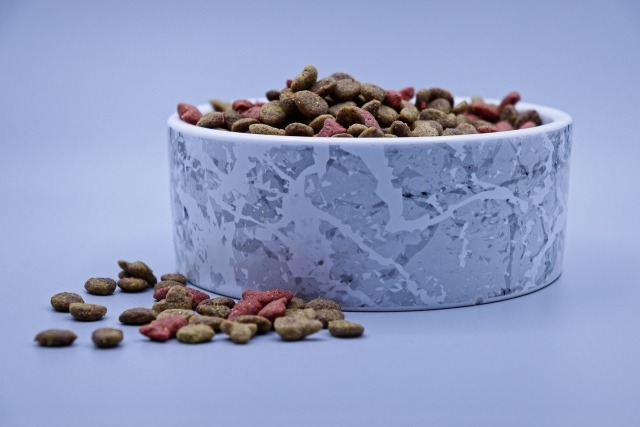
Some of these grain-free alternatives include lentils, sweet potatoes, potatoes, cranberries, tapioca, and a few others. Many grain-free cat foods contain hidden ingredients that are a source of gluten which is not good for cats. The best thing you can do to avoid this issue is to buy grain-free cat food from reputed pet food brands such as Hill’s Pet Nutrition, Purina, Royal Canin, etc.
Veterinarians’ Opinion On The Grain-Free Diet For Cats
In general, veterinarians from around the world have mixed opinions on feeding grain-free cat food to cats.
Those veterinarians who recommend feeding grain-free cats consider it healthy for cats. They usually recommend it for cats who are obese and those who are picky eaters or suffer from grain allergies.
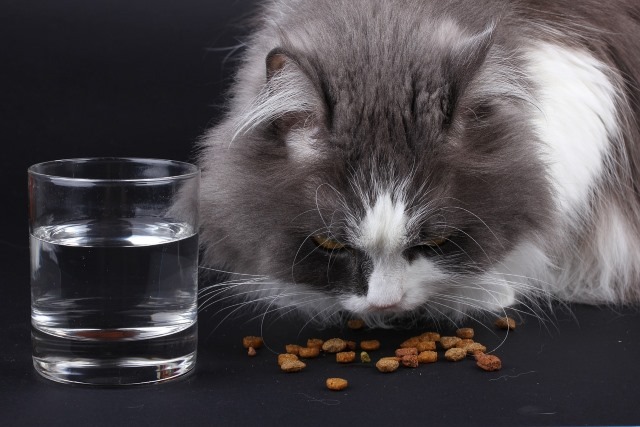
Veterinarians who don’t support feeding grain-free cat food state that it can lead to heart diseases in cats such as DCM and can also lead to deficiencies of certain nutrients such as taurine, especially if you feed a low-quality diet.
Choosing The Right Food For Your Cat
Following are some of the important things you should do when selecting cat food for your pet:
Consult a veterinarian
The first and foremost thing when selecting cat food for your kitty is to consult a veterinarian because they know better about the dietary needs of your cat. A vet can help you choose the right cat food based on your cat’s weight, health conditions, age, and breed.
Read the label
Reading the label and understanding the ingredients is critical when selecting cat food. Whether grain-free or with grains, ingredients will directly impact the health of your cat. Steer away from cat foods that include artificial flavors, plant-based protein, soy meal, preservatives, and ingredients such as peas, potatoes, legumes, and lentils.
Choose according to age
Always select cat food based on your pet’s age because the dietary requirements of cats change with their age. For example, feeding kitten food to an adult cat will do no good and may lead to health issues. Young cats generally need higher protein content in their diet due to their rapid growth rate whereas senior and adult cats require less protein.
Look for real meat ingredients
Prefer cat food that includes real meat ingredients as it is healthy for cats and they can easily digest it. Cat foods that contain organ meats are very nutritious and healthy for cats.
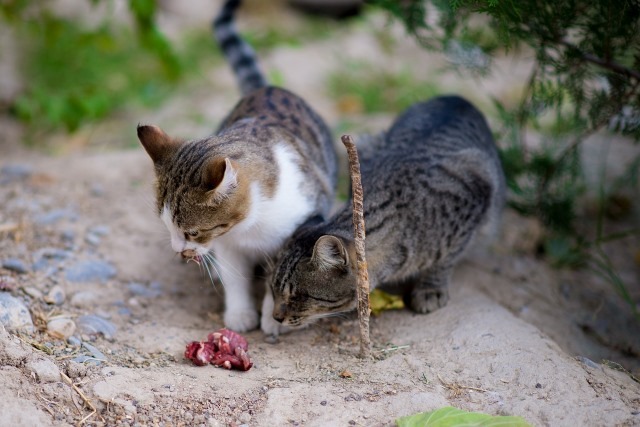
Conclusion
Grain-free cat food is not harmful to cats and they can safely eat it if it contains high-quality ingredients. Grain-free cat food is a good choice for cats that suffer from grain allergies, have gluten intolerance, or are picky eaters. It is also a great food for cats that are overweight since it is low in carbs.
However, some veterinarians don’t recommend it because they believe grains are good for cats as they are rich in certain nutrients. Also, some brands add unhealthy ingredients to grain-free cat food to increase its carbohydrate content which can cause heart problems in cats.
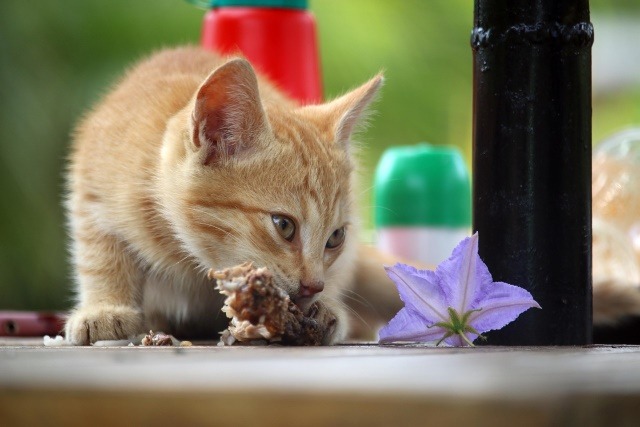
Nevertheless, whether you choose cat food that is grain-free or contains grain you must remember one thing: a balanced diet is actually key for good health in cats.
Ideally, cat food should be high in protein and low in carbohydrates. Raw cat food is a good alternative to grain-free cat food but you should avoid vegan cat food because it lacks certain nutrients that are essential for cats.
References:
- Alvarez, L. (2021, December 1). Grain Free and Cats: Is Grain Free Food Bad for Cats? The Honest Kitchen. https://www.thehonestkitchen.com/blogs/pet-food-ingredients/is-a-grain-free-diet-best-for-cats-qa-with-dr-leilani-alvarez-dvm#:~:text=No%2C%20cats%20don%27t%20need,to%20eat%20their%20whole%20prey.
- Boland, Z., DVM, & Boland, Z., DVM. (2022, November 30). The Truth About Grain-Free Diets For Cats. Cats.com. https://cats.com/grain-free-diets-for-cats
- Cats. (2022, November 29). The Truth About Grain-Free Cat Food (Explained by a Vet) [Video]. YouTube. https://www.youtube.com/watch?v=GOywYSE7SYg
- Is Grain-Free Pet Food Safe? | Stand For Animals. (n.d.). https://standforanimals.org/resources/blog/is-grain-free-pet-food-safe#:~:text=Grains%20contain%20important%20amino%20acids,the%20development%20of%20heart%20disease.
- Miller, M. E., DVM. (2022, August 25). Is Grain-Free Cat Food Better? https://www.petmd.com/cat/nutrition/grain-free-cat-food-better
- Morrison, K. (2019, October 26). The Rise and Fall of Grain-Free Pet Food – Food Industry Executive. Food Industry Executive. https://foodindustryexecutive.com/2019/10/the-rise-and-fall-of-grain-free-pet-food/
- Soobroyen, A. (2022, July 15). The Truth About Grain Free Cat Food. Scrumbles: Natural Pet Food. https://scrumbles.co.uk/blogs/news/the-truth-about-grain-free-cat-food
- Thibault, Y. (2021, November 26). GRAIN-FREE PET FOOD: WHAT THE SCIENCE SAYS – Globalvet. Globalvet. https://globalvet.ca/en/2021/11/26/grain-free-pet-food-what-the-science-says/#:~:text=DEBUNKING%20THE%20IMPLIED%20BENEFITS%20OF,are%20healthier%20for%20your%20pet.

